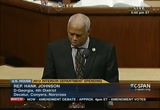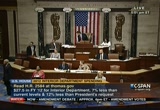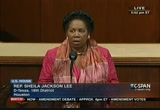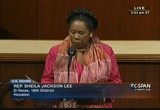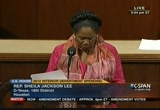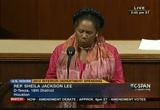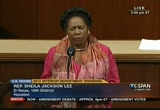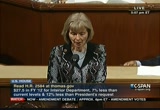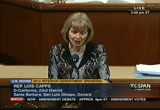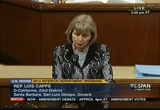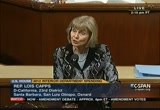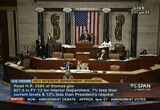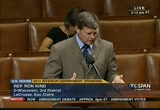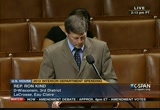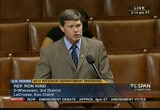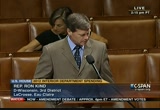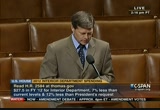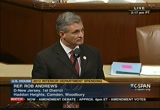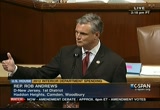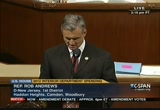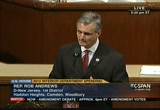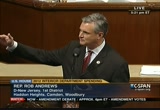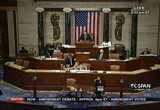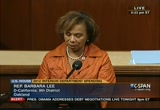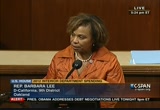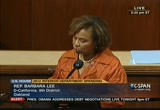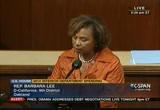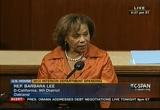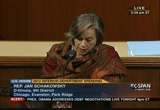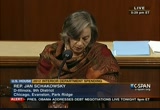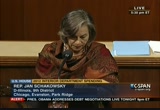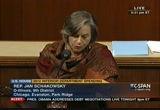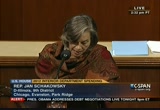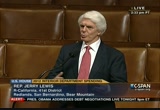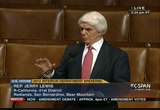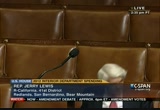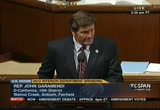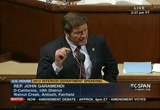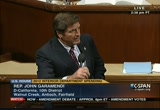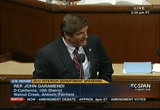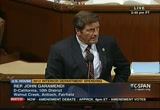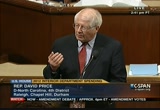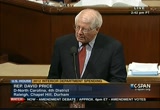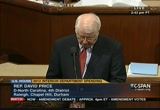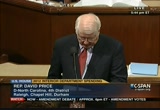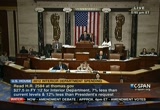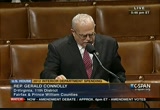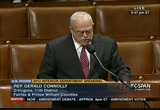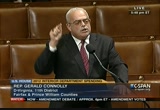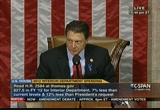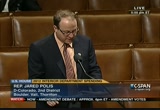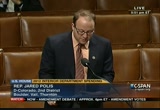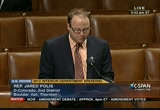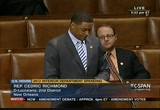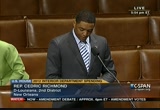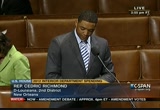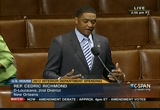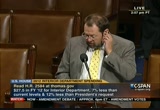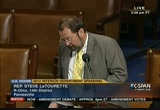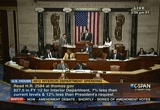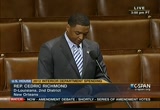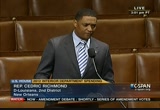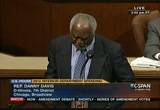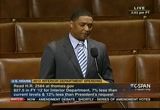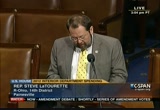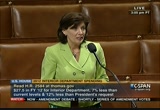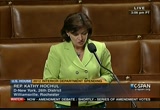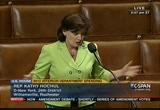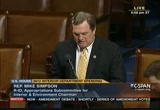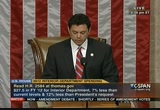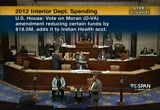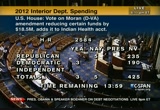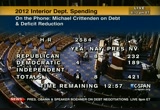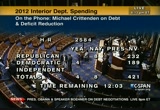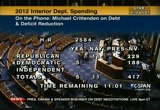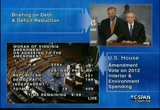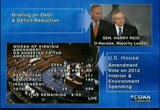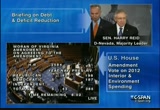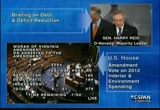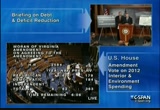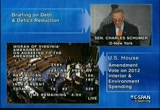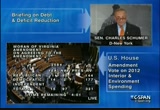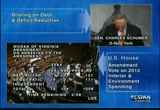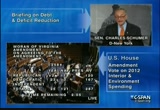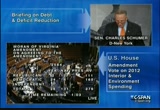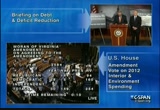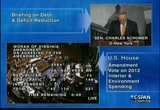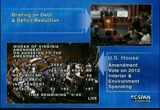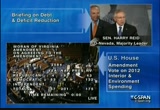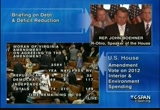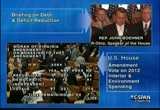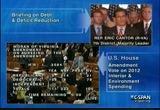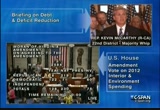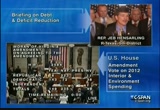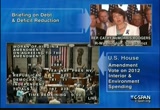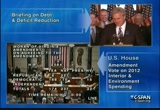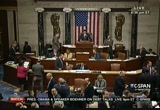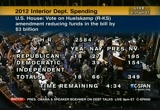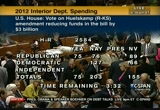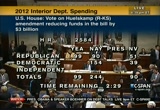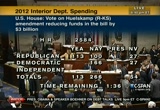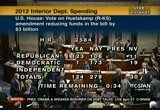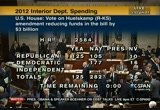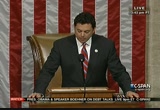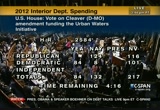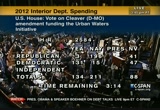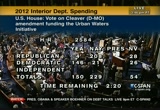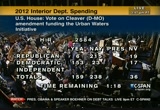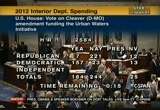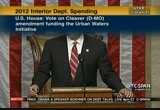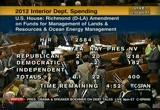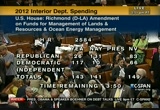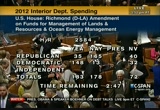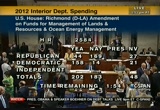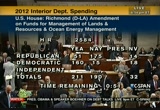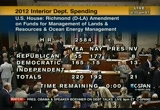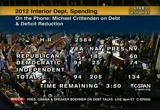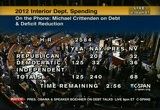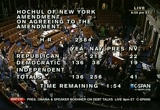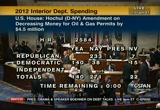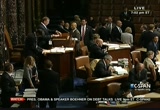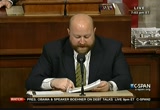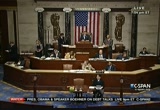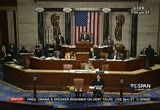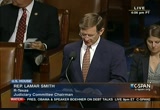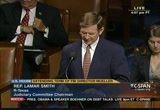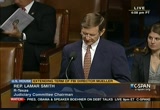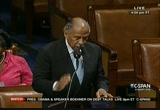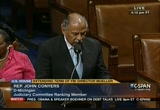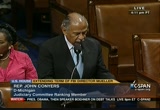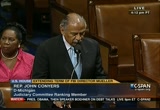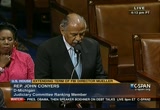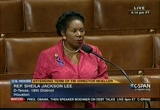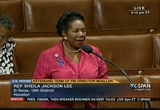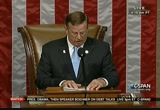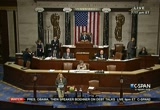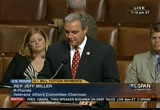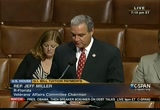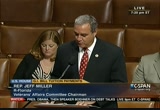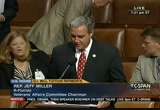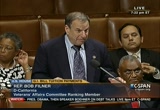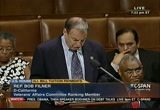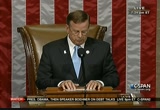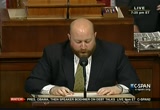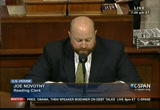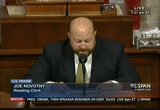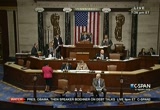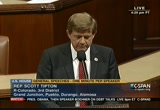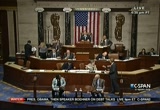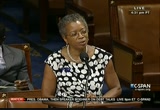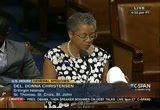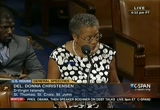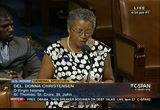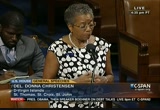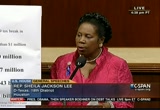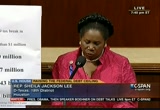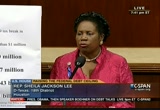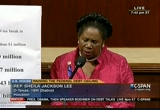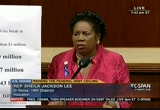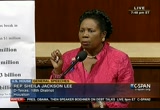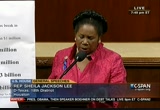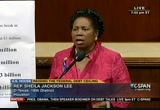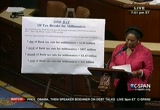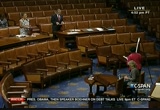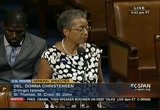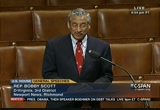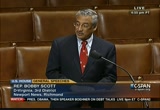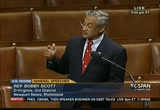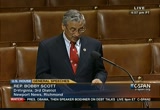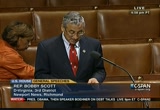tv U.S. House of Representatives CSPAN July 25, 2011 5:00pm-8:00pm EDT
5:00 pm
the grand canyon improve our quality of life. the american people don't want progress if it means our skies get dark year and our waters murk year and they don't want our wildlife to go extinct. but that would be the effect of this bill if this ill-gotten measure passes. mr. speaker, day after day, week after week and month after month, house republicans hand out life preservers to special interests while kicking american people overboard like the bundled tea kicked overboard by the real tea partiers at the start of the american revolution. sure our children have asthma but big business gets to pump more pollution into our air. sure our water is tainted, but special interests get to dump s.
5:01 pm
yes, our endangered species slowly fading away, but now we can drill in their habitat. what happens, mr. speaker when our air becomes too dirty to breathe, when our water becomes too dirty to drink and when our wildlife all go extinct? i urge a no vote on this bill, but before i close, i would like to remind my colleagues across the aisle that the captain always goes down with the ship. and that's the real deal. . the chair: the gentleman yields back. for what purpose does the gentlelady from texas rise? the gentlelady is recognized for five minutes. ms. jackson lee: colleagues, mr. chairman, if i might, i
5:02 pm
wanted to start by acknowledging the loss of our valiant capitol police, officer jacob j. chestnut and detective john gibson of which were honored today and just wanted to acknowledge the men and women of the united states capitol police for their service and my sympathy, again, to the families of officer chestnut and detective john gibson. i also wanted to make note of my worshiping with the norwegian seaman's church yesterday in houston and let the norwegian people and the people of norway know that america stands with them during this very difficult time. i thought it was appropriate to acknowledge those tragedies because it is a time when we have had to come together and i also believe that as we look at
5:03 pm
where we are today, there should be an opportunity for us to be able to come together, so i'm disappointed in this legislation because it really does not seem to call us to do that. i want to remind america and my colleagues that we are 50 states, but there are times when we act on behalf of our states and districts, but there are times when it is important to exist as a single nation. one single state did not defend the nation after the attacks on pearl harbor we came together. one state on its own or one region did not end segregation and establish civil rights. we did it together. there are times when the stakes are so high that we simply must unite. so i raise the question of where are we with this bill that seems to attack both clean
5:04 pm
air and clean water by repealing requirements that prevent pesticide spray from chemical companies from entering rivers and streams. i come from the energy sector. i believe that the energy sector creates jobs. i also believe that we can be a good neighbor, strong in our domestic development and production, but also concerned about clean air. when you listen to those who have worked in this area for so long, you hear opposition from the wilderness society that says this is an extreme assault on america's bedrock environmental protection. the clean water network that says these severe spending and budgetary cuts in this bill includes not only cut bus a series of policy riders really having no place in the appropriations process. and the american lung association, the american public health association, physicians for social responsibility, budget cuts or
5:05 pm
policy riders would impact e.p.a.'s ability to do their job. i don't know if our members realize that in 2011, we cut 16% from the e.p.a. now we want to cut 18%, over $1.5 billion. that cripples the very agency that protect ours water and our air. protects our children and our elderly. what is the response to our responsibility to be the custodians of this wonderful nation? what a beautiful country we have. then to hear that another 1/3 is being cut from the national land safe and conservation system that does monuments and trails and wild rivers. how many families pack up in times that are hard and take a road trip to travel the beauty of this nation, the tall mountain the deep valleys and the wonderful rivers?
5:06 pm
let me tell you what this legislation will do, it will be a litany of additional cuts, it will cut fish and wildlife and the bureau of indian affairs. it assaults what we're trying to do here in america. how many friends know that we have had over 230,000 deaths each year because of the lack of regulating toxins in the air? or let me correct that and say, we've been able to protect 230,000 deaths each year by regulating toxins in the air. we've heard my colleagues come to the floor of the house and talk about the rising increase in many cities of asthma. let me make it very clear. we want to create jobs. i've joined together where we can deregulate and de-entangle the regulations that would keep us from creating jobs. but i also believe when it comes to protecting the nation's assets, we join
5:07 pm
together as republicans and democrats. i remind you that none of this creates jobs, i remind you that we have already engaged in these cuts. isn't it interesting that in regular order, we're now doing, even though there's disagreement, what our friends on the other side of the aisle said they can't do, that's why they're not raising the debt ceiling. i will tell you these draconian cuts along with these draconian the pate on the debt ceiling is going tounds mine america. the chair: the gentlelady's time has expired. for what purpose does the gentlelady from california rise? >> to address the house. the chair: the gentlelady is recognized for five minutes. mrs. capps: i rise to strike the last word and rise in strong opposition to this reckless bill and the abundance of extraneous and irresponsible provisions it contains. we're down to the wire on defaulting on our debt.
5:08 pm
instead of focusing on a way forward, the majority is offering up this piece of ill-conceived legislation, a bill that is polluted with unrelated and inappropriate riders that do not belong in a spending bill. the reality is that these riders will have very little impact on our national deficit. but they will have a huge and lasting effect on our health, our environment, and our natural resources. so why are these programs being targeted? we've seen this before with h.r. 1 earlier this year. we're seeing it again now. the majority is choosing to reward big oil and polluters at the expense of the air we breathe, the water we drink and the wildlife and wild places we hold dear. mr. chairman, it's not an exaggeration to say that this bill drastically undermined our government's ability to protect our environment. this bill yep ardieses the conservation and protection of places like the tamil islands national park in my
5:09 pm
congressional district. closing a quarter of national wildlife refuges across the country, affecting places like the guadeloupe dunes near santa maria, slashing support for federal programs that support our outstanding natural areas like the piedras blancas light station. opening up protected and sensitive areas in california's national forest to offroad vehicle use, putting places like los padres national forest at risk and blocking the protection of wilderness quality land. as the bill stands, it would bar new listings of threatened and endangered species as well as critical habitats. it would gut the fund that preserves irreplaceable land and waters. under this disaster of a bill, the lwcs will be reduced to its
5:10 pm
lowest level in its 40-year history and who will benefit from this cut? not the american taxpayer, because this is paid for through offshore drilling revenues. instead, communities will lose jobs. but this assault isn't limited to lands and wildlife this dirty legislation is also littered with riders that seek to gut the protections of the clean water an clean air act such as preventing the e.p.a. from strengthening limitations on polluting storm water runoff, blocking the water use by power plants, impiding the clarification of which streams and wetlands are protected under the act. under the house spending plan, the revolving funds will also see significant tuts. these are the funds established for states to complete water infrastructure projects, projects which create jobs and provide clean, safe drinking water.
5:11 pm
the riders in this bill, mr. chairman, are also an assault on the very air we breathe. they would prevent the e.p.a. from limiting carbon pollution from power plants and other stationary sources, from updading limits on smog and mercury emissions. one rider would block the e.p.a. from setting new mileage standards for cars and won't allow the state of california to set its own standards. surely we can think of better solutions to solve our fiscal problems rather than attacks our air, water an lands. sadly, this bill deeply undermines our important role of passing on an america whose land, water and air are clean, healthy, productive, beautiful and accessible for all to enjoy. i strongly urge my colleagues to vote no on this terrible, terrible bill. i yield back the balance of my time. the chair: the gentlelady yields back. for what purpose does the gentleman from wisconsin rise? >> i move to strike the last word. the chair: the gentleman is
5:12 pm
recognized for five minutes. >> mr. chairman a as one of the co-chairs and leader of the sportsman's caucus, the largest bipartisan caucus in this congress, i reluctantly rise in opposition to this bill this bill falls short on so many different levels, especially our responsibility to future generations to be good stewards of the public land, the vital natural resource the wildlife we have within our borders. but don't take my word for it, mr. chairman. we've had a tradition in this place for many years of having strong, bipartisan support for reasonable, sensible land and water conservation programs. that's why earlier this month a coalition of over 640 outdoor recreation entities sent a letter to each of our offices including the congressional leadership expressing their deep concern and dismay over the funding cuts proposed in this appropriation bill. this letter was signed by entities such as the boone and crockett club, ducks unlimited,
5:13 pm
national fish and wildlife foundation, thabble wild turkey foundation, tedy roosevelt conservation partnership, trout unlimited and it was also signed by the president of the wilderness society, bill meadows and the board member of the civil war trust, john mao. i'd like to read the letter at this time. we are a broad coalition of organizations representing millions of members with diverse political backgrounds and areas of interest united behind a shared belief that natural resource conservation,out door recreation and historic preservation are vital to the future of our great nation. like you, we are concerned about our nation's fiscal health. the nation faces unsustainable future fiscal deficits which must be addressed. as part of the overall solution to our deficit challenges, we know that conservation, recreation, historic preservation programs will not and should not be exempted from scrutiny. we are willing to engage in a process to find further savings
5:14 pm
in spending to review the economic and budgetary support for programs. the federal budget should not be balanced dispr portion gnatly on the backs of outdoor recreation and preservation because of future yen rations whose well being dependsen oour conservation of natural resources. we care about natural resource conservation, outdoor recreation and historic preservation. we stand ready to work with you on a serious effort to address the nation's serious economic and fiscal challenges as they relate to choices in and above what we care about. we urge the congress to address the federal deficit while addressing in critical conservation and historic reservation programs in 2012. end quote. i ask unanimous consent to have the record -- have this letter inserted in the record at the appropriate time. the chair: that will be covered
5:15 pm
by yen leave. mr. kind: these groups and many of us realize this is more than just being good stewards of the land and doing right by future generations. investment in these programs are crucial for economic development and job creation in this country. the outdoor industry foundation issued a survey from year to year showing the economic impact of many of these conservation programs on outdoor recreation activities. they found that outdoor recreation contributes $700 billion annually to the u.s. economy, supports 6 ppt 5 million private sector jobs, one of every 20 job, and stimulates 8% of consumer spending. in wisconsin alone, my home state, hunting and fishing aloan supports 57,000 jobs $400 million in state revenue, sportsmen spend $3.1 billion annually which helps stimulate the wisconsin economy and other states. .
5:16 pm
mr. chairman, these programs have been giving at the idle of deficit reduction for sometime. in fact, over the last 30 years, americans investment in parks, wildlife, clean air, clean water has fallen from 7.1% of overall budget to 6%. so throughout the years there's been a continual reduction for these programs. for every public dollar used it's leverage to draw in more private sector dollars. this, too be, will be in great jeopardy with the dismantling of these programs. these aren't programs that you can turn off at the spigot. you need a continuity of it going. with funding of this magnitude it will be difficult if not impossible to remain that continuity of care. whether it's to clean water, clean air, wildlife, all of these programs are under direct result of the interior
5:17 pm
appropriations bill. the irony with another program it's funded by oil royalties. it's a grand bargain that's been used in the past to allow oil on public lands. i encourage my colleagues to vote no on this appropriations bill. we can do better than this. i yield back. the chair: the gentleman yields back. for what purpose does the gentleman from new jersey rise? >> i move to strike the last word. the chair: the gentleman is recognized for five minutes. >> i ask unanimous consent to revise and extend my remarks. the chair: without objection. mr. andrews: thank you, mr. speaker. thank you, mr. chairman. there's an unfortunate time-honored tradition in the house of people coming to the floor and objecting to reductions in spending with heart felt arguments as to why the spending is necessary and never offering any suggestions about where the money might be made up instead. and that frankly is one of the reasons that we have the huge deficits and debts that we do, so i want to break with that tradition and talk to you about
5:18 pm
a spending reduction i have a great concern about and then talk about how we might make it up instead. there is not a person in this house who's not been touched in some way by cancer in their family and someone they love, some friend. i don't think there's anybody here that hasn't had the heartbreak of dealing with malig nancy in their family -- malignancy in their family. i don't think there is not a member that could do anything about solving this problem. there is not a republican or democrat who is indifferent of the problem of fighting cancer. now, cancer comes from a lot of things. it's genetic, it's he had red tear, it comes from foods. a lot of it comes from the environment, it comes from water. if the water we cook with, bathe in, it could be the trigger of the dreaded disease
5:19 pm
of cancer . so a long time ago when this was discovered in the 1960's there was a bipartisan agreement to try to do something to clean the water of this country and keep it clean. and it was upheld by presidents like ronald reagan and george bush, bill clinton, jimmy carter, barack obama, many others, republicans and democrats in control of congress. that's why i have to look at the bill before us today and just be astonished by the fact that the clean water fund is cut by 55%. let me say this again. the fund that has been set up to protect the clean water of our country, that is consumed by republicans and democrats, liberals and conservatives, cut by 55%. the amount of that cut is about $833 million below the amount
5:20 pm
of money that we spent last year. about $833 million. now, usually people stop there, but i want to talk about where we should get the money instead. $833 million is less than three days worth rf spending in iraq and -- of spending in iraq and afghanistan. how about that? we will spend more than $833 million in the next three days in kabul and baghdad. in part to help build clean water systems there. in part to help create jobs there. i just think that's inexcusable that we find ourselves in a position where we're spending in two or three days in iraq and afghanistan when we could spend to eliminate this cut and provide clean drinking water for the people of our country. the amount of subsidies we're going to give oil companies.
5:21 pm
the oil companies made record profits in 2010. they made about $60 billion in profits, if i'm not mistaken. $77 billion, actually, in profits last year. we'll spend six times as much of this cut in the clean drinking water fund to give money away to those oil companies this year. these are people who made $77 billion in profits last year, whose stocks are off the charts, who are paying their c.e.o.'s hundreds of millions of dollars in compensation, and we're going to give them about $7 billion from the wallets of the people of this country this year. that's six times the amount of this cut in the clean drinking water fund. the clean water fund, excuse me. so i understand if you come to the floor you have the responsibility of saying, if you don't cut this you have the responsibility of saying where else we should get it from.
5:22 pm
so, ladies and gentlemen of the house, my proposal would be this -- let's not reduce the clean water fund by 55%. let's not say to cities and villages and towns and states and indian tribes around our country that the money that we lend to them -- we don't give it to them. most of the time it's a loan to help bring clean water to our kitchens and our homes and our places of worship and work, hospitals, let's not reduce that. instead, let's take 2 1/2 days of what we're going to spend in iraq and afghanistan and put it there. let's take 1/6 of the money we're going to hand to the oil companies and put it there. this is something we shouldn't do. i yield back the balance of my time. the chair: the gentleman yields back. for what purpose does the gentlelady from california rise? >> i move to strike the last word. the chair: the gentlelady is recognized for five minutes. ms. lee: thank you very much, mr. chairman.
5:23 pm
i rise to i move to strike the requisite number of words and rise in opposition of the interior appropriations bill. as a member of the appropriations committee i want to thank ranking member moran and our full committee ranking member, congressman dicks, for leading the fight every step of the way against this republican assault on the environment. sadly, mr. chair, this bill is nothing more than a vehicle for bigger profits for big oil and other special interests polluters. this bill in all it contains destroys critical environmental standards established to protect the public's health. by attacking more than 40 extremely dangerous policy riders, the republicans take direct aim on the water we drink, the air we breathe and the environment in which we live. this terrible legislation guts the budgets of key federal agencies charged with protecting our citizens and our
5:24 pm
natural national resources. it terminates air quality standards as well as air and water conservation money that will impact all communities in our country. but these cuts will hit my home state of california especially hard. mr. chair, i'm proud to serve as a representative of california's ninth congressional district which has long been at the forefront of the environmental movement including working on critical issues of climate change as well as fighting for renewable energy, green jobs and environmental justice. this bill undermines the clean air act's ability to crack down on air pollution, threatening the quality of life for our children, our families, our communities including my constituents in the east bay, many of whom suffer unfairly from poor air quality. now, let me just tell you this story, this personal story. many of my childhood friends, mind you, who grew up in -- with me in my neighborhood, a
5:25 pm
polluted neighborhood in el paso, texas, many of them were dead, mind you, before they turned 55 years of age or many of them who are still alive have chronic or debilitating diseases. and these tragedies can be directly related to environmental degradation in the neighborhoods which i lived in and grew up in in el paso, texas. also, let me say, this bill is unjust because it really does refuse to fund e.p.a. at a level where there can be some justice in terms of the overall programs of the environmental administration where it can implement its core mission of protecting human health and the environment. this means that more women and more children and more people facing or living in impoverty or neighborhoods of color are
5:26 pm
bearing the brunt of pollution, environmental degradation and climate change. sadly, this is in line with the republican plan to balance the budget on the backs of the poor. rather than creating jobs, this bill guts funding to create jobs, especially green jobs. rather than the republicans taking action to protect our nation's clean water supply and open spaces, this bill takes us back to dirty water and closed parks. rather than taking action to ensure that people across this country can trust our government, and they want to trust us, to protect the water that they drink and the air that they breathe, this bill rolls back the standards and protections aimed at protecting public health. mr. chairman, as a person of faith, i believe that there is a moral and ethical responsibility to protect the natural resources provided by our creator. this measure before us prohibits us from acting on
5:27 pm
that very, very serious and important responsibility. how can we here make decisions that knowingly harm people? how can we make decisions that pollute our environment? how can we make these crass decisions as members of congress that will increase health hazards leading to diseases such as cancer? people elect us because they trust us to make decisions to protect and enhance their quality of life. they want us to preserve our beautiful planet. future generations are counting on us. this bill really does let them down. we need to defeat this horribly destructive bill and move quickly to matters that american people expect us to address like to create jobs, to raise our debt ceiling and to protect the public health. thank you and i yield the balance of my time. the chair: the gentlelady
5:28 pm
yields back. who seeks recognition? for what purpose does the gentlelady from illinois rise? >> to strike the last word. the chair: the gentlelady is recognized for five minutes. >> thank you, mr. chair. while our nation stumbles to a default, we are wasting time to consider a bill that will not move through the city and which the president has already threatened to veto. ms. schwartz: it articulates the republicans in this house of representatives. this is a bill that really makes one shake one's head. it is an astonishing effort to destroy hard, longstanding and successful popular laws. ms. schakowsky: it balances minimal cost savings on the
5:29 pm
back of our most precious natural resources. h.r. 2584, the funding bill for the department of the interior and environmental agencies, completely guts funding for public lands and public health programs that the american people care about and desperately need. a 64% cut to the state and tribal wildlife grants program and a 95% cut to the cooperative endangered species conservation funds mean we can expect a rapid increase in endangered and extinct species on federal and nonfederal lands alike. an 80% reduction to the land and water conservation fund means we should not expect adequate maintenance of landmarks including harpers ferry, west virginia, yellowstone national park, or california's big sur coast. a 40% coast to the national
5:30 pm
landscape conservation system means 27 million acres of national monuments, wilderness >> scenic rivers and other treasures will be inadequately protected. a 60% cut to the northern american wetteland conservation act means our birds and fish and wildlife resources will lose protections that keep these populations viable. a 55% reduction to the clean water state revolving fund means less protection for quality -- for water quality and improvement projects in the united states. . and a prohibition of funding for the great lakes restoration initiative mean mishome state of illinois and the great lake michigan will lose millions of dollars in federal assistance to promote food jobs and clean drinking water for millions of our citizens.
5:31 pm
and while this bill severely cuts these and other priorities, it provides handouts to corporate polluters in the form of policy riders. these would threaten public health and environmental laws which have protected our country for decades. one rider reverses a moratorium on uranium mining on the rim of the grand canyon. it would turn one of our nation's most iconic landmarks into an eyesore. another extends loopholes from the clean water act jeopardizing drinking water for 117 million americans. many others weaken the clean air act which saved an estimated 160,000 lives just last year. the clean air and clean water act protected american health and welfare for 40 years and have been the cat rhys for green energy investment and job creation.
5:32 pm
more than 80% of the american people believe the e.p.a. should not be prevented from performing its duties. a gallup poll reports that four out of five americans are concerned about the water they drink, as well they should. although this legislation is dead on arrival at the white house, it poses a fundamental debate about the type of country we want to hand over to our children and grandchildren. do we want to be a nation that oversees the disappearance of animal populations and weltlands and national parks because we aren't willing to ask for one penny more from millionaires and billionaires? do we want to be a nation that turns away from water treatment and infrastructure in the hopes that no one will notice? do we want to be a nation that values the profits of corporate polluters over the health of children? the republican majority has clearly stated its position. i oppose this bill. the funding cuts and destructive policy riders that rid until bill turn back the
5:33 pm
clock on vital environmental and health policies. we owe it to our children and grandchildren to uphold our commitment to clean air, clean water, and preserved natural resources. this weekend, my grandchildren, my granddaughter, who celebrated her 10th birthday, had her party on lake michigan and enjoyed the precious clean water. i urge my colleagues to vote against this attack on our american resources and our values. the chair: the gentlelady's time has expired. for what purpose does the gentleman from california rise? >> mr. chairman, thank you for recognizing me, i strike the last word. the chair: the gentleman is recognized for five minutes. mr. lewis: i've been listening from afar to this discussion on the floor which is so, so fascinating. the former majority wanting so desperately to become the majority again is suggesting that by way of this bill we're taking the heart out of america's infrastructure
5:34 pm
program. the fact is, in recent years, the former majority increased spending in all these categories at levels that would almost startle the people if they could ever see the detailed facts. the fact that we are not increasing spending to their wish list ahead some way becomes a cut in their mind's eye. when we're faced with reality that the covered wagon that took us to california from the east is about to go over the cliff of bankruptcy if we don't do something about spending. this same voice or series of voices currently is doing battle over the debt limitation and they're suggesting that we're holding this up because of some loopholes in taxes otherwise for the so-called rich. conversations taking place by many of the rich of the house indeidre flects the reality that what they really want is more spending, more funding for these programs, while we're
5:35 pm
attempting to make an effort to cut back spending and cut the impact of government in the private sector, these same voices will not give up until they have an opportunity for more taxes. so one of the two parties having this discussion want more spending in government programs, want more taxes, the other side of this discussion would suggest we ought to cut back spending, make sense out of our budget and recognize that the private sector keeping some money in their jeans, investing in the private sector, is the way to create jobs. while it's fascinating to watch this discussion, i'm glad to come back three or four more times and have this discussion but in the meantime, i wish more people would talk about what they really know about the environment or really know about the interior bill rather than the rhetoric that's part of next year's campaign.
5:36 pm
the chair: the gentleman yields back. for what purpose does the gentleman from california rise? >> to strike the last word. the chair: the gentleman is reck thesed for five minutes. >> what a fore-- mr. garamendi: what a fortuitous moment to flole my colleague from california. i do know something about the interior budget. i know what the department of interior means to america. early this morning, i left sacramento. my mind was very much on the debate you just suggested, what are we going to do about the deficit. it didn't take long as i sat by the window, as i moved over the sierra nevada mountains, to nevada and across the rockies and across the entire nation. for most of the way it was rather clear. we have an awesome, unbelievably beautiful country and we're the strongest nation in the world and we have great economic strength. this bill, however, would take this great nation, the great
5:37 pm
beauty, the incredible people of america and put them at risk. and put this nation's ex-trordnary beauty and resources at risk. that's what this is about. this isn't going to solve the budget deficit one way or the other. this is a min us kuhl part of the overall federal budget. important, important because it is about this nation's physical and human health. we're talking about the environmental protection agency. this bill as written would bring to the people of america poison. it is the poisoning of our rivers and our air. use whatever word you want about cleaning up, use the nice words, but we're talking about poisoning the rivers and air of america. that's what this bill does. when you take the environmental protection agency and you take away its ability to protect us,
5:38 pm
then you are allowing poisons to be in our water and in our air and in our land. you look at this and you're talking about, i will not yield, you can have your time later. you look at this bill, you're talking about the extraordinary physical nature of america. do you want the great mountains of the appalachias to be flattened so you can have more coal to burn it and foul the atmosphere? that's what this bill does. do you want to take away the ability of this nation to protect your precious mo javy desert? that's what this bill -- mojave desert? that's what this bill does. do you want to allow those who would destroy by grabbing the resources of this nation without even bothering to pay a decent royalty, that's what
5:39 pm
this bill does. whether it's the oil in the gulf or the copper in a new mine in arizona. i've listened to the republican bills day after day on this floor and in committee and they would strip away, they would strip away the protections that americans want for their health and for their land. that's not what we should be doing. you want to know where the money is? my colleague from new jersey said it very well. it's in afghanistan and it's in baghdad. we're building the bridges, we're building -- cleaning the rivers, providing the water and electrical systems there to the tune of $150 billion a year. bring our troops home. bring our money back to america. build america. we re-build america. there's the answer. not in this way.
5:40 pm
-- not in this way will you ever solve the deficit. and by the way this bill lays off people. 15,000 people at the e.p.a. alone. this bill will not build infrastructure. this bill will take away the infrastructure for our sanitation systems, for our water systems. that's what this bill does. my colleague from california knows full good and well what's intended here. it's to give our resources to the polluters. it's to foul our air. it's to remove the ability of the people of america, not some government in washington, but the people of america have for the last 40 years demanded clean water that their resources be protected, that the commons be protected. s the people of america that want a future that's good for their children. that want a future that's viable. that want a future that does not have poisoned water and
5:41 pm
air. that's what the people of america want. this bill goes exactly the wrong direction. i yield back my time. the chair: the gentleman yields back. who seeks recognition? the gentleman from north carolina is recognized. for what purpose does the gentleman rise? >> i move to strike the last word. the chair: the gentleman is recognized for five minutes. >> mr. chairman, i rise in opposition to fiscal 2012 interior and environment appropriations bill. i do want to start on a positive note, the bill would restore the president's proposed cuts to mitigation fish hatcheries, that's a good thing. it would increase funding for the indian health service and it would largely maintain funding for the national park services and the smithsonian. i commend them for those digs. mr. price: but the list of positive things is pretty short. i want to in the time i have
5:42 pm
list some of the devastating cuts this bill includes. while our friend from california has suggested these real really aren't deep cuts, i believe the content of this bill belies that notion. the bill before us picks up where h.r. 1 left off last spring, making numerous and deep cuts to the programs that protect our air, water, public lands and wildlife. here are just a couple of the most egregious cuts in this bill. first the land and water conservation fund. this funds the accusation of public lands so they're protected from development can be enjoyed by future yen rations. the land and water conservation fund has a dedicated revenue stream from offshore drilling royalties. it takes nothing from the general fund. yet this bill would cut land and water conservation [captioning made possible by the national captioning institute, inc., in cooperation
5:43 pm
with the united states house of representatives. big 80%, the lowest level of funding for the program in 45 years. it threatens completion of the accusation of the rocky ford track in east tennessee and several treasures in north carolina that need protection. every member of this body should ask, how many accusation projects would this halt in my state? there is no reassuring answer. secondly, the environmental protection agency. the bill continues the republican majority's assault on the e.p.a. after imposing a 16% cut in the current fiscal year, the majority is now proposing a further 18% reduction in the agency's budget. that would push agency staffing to 1991 levels. the goal of the cut so massive is plain and simple to ensure that e.p.a. doesn't have the resources it needs to fulfill its core mission, including life-saving and life enhancing research based in my district at research triangle park. third, the clean water and
5:44 pm
drinking water state revolving fund, the s.r.f.'s, provide funding to states to fund water infrastructure projects to allow communities to better manage wastewater and protect clean and safe drinking water. this provides one of the most basic services taxpayers expect. clean water. and yet this bill would cut funding for these two programs by nearly $1 billion combined. given how essential water supply is to economic growth, this is ironic at this particular time as our communities struggle to retain and regain jobs. i suggest to colleagues, ask your state and local governments how they're going to make up this difference. mr. chairman, as if these cuts weren't bad enough, the majority has loaded this bill with legislative policy riders and funding limitations that will roll back 40 years of progress toward clean air and clean water. these anti-environmental riders have no place in an
5:45 pm
appropriations bill. they will not save the country a penny and will cost tens of thousands of lives, expose our children, families and communities to unnecessary illnesses, and they will degrade our irreplaceable natural resources. the majority claims that these cuts are needed to demonstrate fiscal discipline. mr. chairman, this book is a textbook case in false economies. in gutting critical environmental protection programs, it piles up frightful economic and human costs for the future. our constituents and our environment today and in future generations deserve better than what this bill is offering. i urge my colleagues to oppose this shortsighted appropriations bill. i yield back. the chair: the gentleman yields back. for what purpose does the gentleman from virginia rise? . >> i move to strike the last
5:46 pm
word. the chair: the gentleman is recognized for five minutes. >> well, congratulations. this is probably the most radical environmental bill that the house of representatives ever considered. mr. connolly: it cuts funding to the lowest level in half a century. it opens the grand canyon to uranium mining. it denies the existence of climate change and eliminates funding for federal agencies to monitor and adapt to it. it contains more than three dozen anti-environment policy riders that eviscerate the clean air act, the clean water act, the endangered species act, the national environmental policy act and other environmental statutes. the bill desecrates the legacy of teddy roosevelt and a long line of bipartisan conservation leaders while it also endangers public health. a republican majority claims to be concerned about spending, but this reckless bill would impose billions of dollars, mr. chairman, of health care costs on americans by increasing the
5:47 pm
incidents of asthma, emphysema, heart attacks and even premature deaths. this environmental bill will increase health care costs by up to $539 billion, according to the congressional research service. since medicare, medicaid and chip are responsible for 33.9% of total health care costs, this republican bill will cost taxpayers some $179 billion more. in addition, it will cause more than 60,000 premature deaths. 20 million lost days of work. and 36,800 additional heart attacks in america. this bill eliminates funding for critical land conservation priorities, completely defunding the forest legacy program. it defunds the chesapeake bay restoration program. it blocks environmental protection agency implementation of public health standards for particulat, lead
5:48 pm
and greenhouse gas emissions. it repeals clean water act standards to protect streams from mountain top removal. it imperils the collegeliness of drinking water by unregulated disposal of coal. the republican majority seems to be living in an alternative reality. as americans face unprecedented drought in the southwest, record floods in the mississippi basin, record heat here in eastern and midwestern cities, accelerating sea level rises and other symptoms of global warming, this bill blocks funding even to monitor global warming. not only do republicans deny the existence of global
5:49 pm
warming, apparently, they have even blocked funding to monitor its impacts. this reckless policy rider doesn't just endanger polar bears, coral reefs and countless other species and ecosystems, it endangers american infrastructure. from the norfolk naval base to the jefferson memorial. it endangers public health by increasing smog solution and health-related deaths as we've seen from the recent heat wave that swept across the east and midwest united states, setting record temperatures here in washington, d.c., newark and other cities across the eastern seaboard. i urge my colleagues to reject this reckless legislation that defunds critical land programs, eviscerate 40 years of environmental standards and desecrates the memory of teddy roosevelt. i yield back. the chair: the gentleman yields back. for what purpose does the gentleman from colorado rise?
5:50 pm
>> i move to strike the requisite number of words. the chair: the gentleman is recognized for five minutes. mr. polis: mr. speaker, our country is facing an incredibly important moment as critical decisions need to be made regarding the national debt and our long-term deficit and how to constrain spending. members on both sides of this aisle recognize the reality that we need to restore fiscal responsibility in our budget. however, mr. speaker, in times of national importance we need to stay focus on what our country needs and what's best for the american people and avoid the temptation to play politics as this bill does. far too much has been carried out by the majority party under the guise of cost cutting and the deficit when it's actually policymaking to implement a hard right radical environmental agenda which can actually cost more money in both the short, medium and long term. mr. speaker, the cuts proposed by the majority in bill has everything to do with implementing radical anti-environmental ideology. the bill makes sweeping cuts to critical programs to protect
5:51 pm
the public's health, reduce our expenditures for health care, protect our environment and keep industry from running over the public and consumer rights. yet, at the same time it does that, mr. speaker, it increases spending on programs that are a little more than handouts to oil companies and mining companies. one of the government watchdog group, the grand daddy of federal subsidies it was called. this isn't about saving taxpayer subsidies in this bill. it's about slashing environmental protections or giving handouts in some of the most dirtiest industries. there is more pork in this bill. this is supposed to be a spending bill that -- demanded by the nation's worst polluters, other special interests who receive handouts under this bill. yet, while this bill would do away with the clean water act, putting the rest of us in danger because mountain top coal mining industries and
5:52 pm
factory farms want it and while it does away with provisions of the clean air act, there will be more toxic mercury, arsenic and lead in our air and put our children's health at risk. states would be blocked from moving ahead with their own clean car standards, threatening the health of america's children, elderly citizens and other citizen to eliminate dangerous carbon pollution from power plants and other stationary sources. this bill exat the indicts uranium mining in the grand canyon, gives public exemption of grazing on public lands, doesn't protect big horn sheep and gray wolves and other elements that threaten our environment and are an additional handout to big oil. this is a polluters' wish list of subsidies, handout and pork. the majority can call it what they will but don't say this bill serves the cause of cost
5:53 pm
cutting while it lards up programs that are a little more than a subsidy to wealthy mining and drilling interests. i yield back. the chair: the gentleman yields back. for what purpose does the gentleman from louisiana rise? mr. richmond: mr. chairman, i have an amendment at the desk. the chair: the clerk will report the amendment. the clerk: amendment offered by mr. richmond of louisiana. page 2, line 20, after the dollar amount insert decreesd by $6 million. page 19, line to , after the dollar amount insert increesd by $5 million. the chair: pursuant to the rule , the gentleman is recognized for five minutes and a person opposed will be recognized for five minutes. the gentleman will be recognized for five minutes. mr. richmond: mr. chairman, what this amendment does is increases the funding for our bureau of oceans management and enforcement by $5 million. what it would do is it would
5:54 pm
allow them to quicken the pace to permit approval and in turn promote the rate of oil and gas investment in the gulf region. to accomplish this investment, we will reduce the range land management fund by $6 million which still leaves that fund above its fiscal year 2011 funding levels. now, mr. chairman, let me point out to you why this is the wise thing to do. in response to the deepwater horizon explosion and the resulting oil spill last year, in may the administration issued a temporary moratorium, halting the permits of oil and gas production on the o.c.s. the moratorium was lifted but since then the permits have been slow. president obama directed them to reorganize itself into two independent groups. one that handles revenue from
5:55 pm
oil and gas leasing and the other that regulates the oil and gas industry. this is all the change that most of us believe is necessary and wise. however, the speed of permitting activity has not returned to pre-deepwater horizon levels. there is a significant and growing backlog of drilling plans pending approval. the number of pending deep-water exploration and development plans has increased by more than 250%. this is up from a historic average of 18 plans pending to now nearly 65 pending approval. also, there's a drastic decline in drilling permit approvals. deep-water exploration and drilling permit approvals have declined by approximately 80%, down from an average of nearly 160 per year to a pace of only 30 per year. shallow-water exploration and drofmente, drilling permits have also dropped by nearly 50%
5:56 pm
from an average of 390 per year to a pace of fewer than 180 a year. mr. chairman, i would tell you that there was a recent study that showed that increasing the pace of permitting and subsequently the pace and scale of investment in the gulf would create 230,000 domestic jobs in 2012 as well as more than $44 billion of u.s. gross domestic product. and i just want to harp on that number for a second, mr. chairman, because as we have been here for the 112th congress, the american people have been demanding that we use the money we have efficiently so that we can invest in the american people and get a return on our investment. so here we're asking the american people for $5 million and asking our colleagues on the other side of the aisle who earlier this year proposed legislation that was purported to increase drilling and to lower gas prices.
5:57 pm
well, now they have the opportunity to take $5 million, invest it and have the opportunity to create 230,000. there are 14.1 million people in this country, mr. speaker, who are actively seeking employment who can't find it. here we have a chance to help 230,000 of them in fiscal year 2012 alone sand we have the ability to increase our gross domestic product by $44 million. mr. chairman, i think that's what the american people are demanding. they want us to use our money wisely. that's what this amendment does. i'd just ask my colleagues on both side of the aisles to support this. it's a job-creation amendment, and i would just ask for the support, and i yield back the balance of my time. the chair: the gentleman yields back. for what purpose does the gentleman from ohio rise? mr. latourette: to strike the last word in opposition of the amendment. the chair: the gentleman is recognized for five minutes. mr. latourette: i rise in opposition to the amendment. the amendment would take $6 million from b.l.m.'s lands and
5:58 pm
resources and transfer it. the b.l.m.'s management account has already been cut $43.5 million below fiscal year 2011. this fund allows the b.l.m. to take care of more than 235 million surface acres, further cuts to this account would not be warranted. i want to commend the gentleman for the location where he wants to send the money. have no big opposition to the increase in the other spending, but we did the best we could to balance this particular piece of legislation. boma has already been increased above 2011. it has been increased significantly in several continuing resolutions. therefore, because of the location of the offset, i urge our colleagues to oppose the amendment. i yield back. the chair: the gentleman yields back. the gentleman yields back.
5:59 pm
for what purpose does the gentleman from louisiana rise? the question is on the amendment offered by the gentleman from louisiana. those in favor say aye. those opposed, no. in the opinion of the chair, the noes have it. the amendment is not agreed to. mr. richmond: mr. chairman, i'd like to a recorded vote. the chair: pursuant to clause 6 of rule 18, further proceedings on the amendment offered by louisiana -- the gentleman from louisiana rise. for what purpose does the gentleman from louisiana rise? mr. richmond: i have an amendment at the desk. the chair: the clerk will designate the amendment. report the amendment. the clerk: an amendment offered by mr. richmond of louisiana. page 2, line 20, after the dollar amount insert reduced by $10,617,000. page 10, line 21, after the dollar amount insert increased by $10,617,000. the chair: the gentleman from louisiana is recognized for five minutes. mr. richmond: mr. chairman, again, i rise to talk about
6:00 pm
what i consider to be wise investments into the future and stability of this great country. for the last 21 years the north american whaling conservation act has created jobs and served as an important investment to our nation's economy and for wetlands in every single state. it's responsible for restoring 26 million acres of wetlands, equivalent to the state of ohio. not only did it restore over 26 million acres, it also created nearly 7,500 jobs annually and hundreds of millions in worker earnings every year. . if we look at the fiscal year 2011 appropriations with $37.5 million down from $47.6 million from fiscal year 2010. this bill allocates only $20 million for fiscal year 2012, a cut of 47% from fiscal year 2011 levels and 58% from fiscal
6:01 pm
year 2010. here's the important part. the law requires that each federal dollar put into the program be matched by $1 in nonfederal funds. because the competition for these dollars is so great, on average, each federal dollar is matched three to one. i think that -- over and over again i keep saying that the american people are looking for us to spend money in great country where we get a return on our investment. now we have another program where for every $1 we spend on this program, the american people get $3. that's what we should be doing in these great economic hard ship times. i'm asking my colleagues on the other side to look at where we're spending money in this bill, and put money where we're going to get a good return on our investment, we're going to create johns and at the same time preserve and restore our wetlands.
6:02 pm
that, mr. speaker, i think is the responsible thing to do, the wise thing to do and i encourage my colleagues to support it. mr. chairman, i'd like to yield two minutes to the gentleman from illinois. the chair: the gentleman may not yield blocks of time. the gentleman from illinois is recognized. >> i want to thank the gentleman from louisiana for yielding. i rise in support of the richmond amendment and in opposition to the interior environment propings and i do so because we cannot afford to make such drastic cuts to programs that benefit our nation's drinking water and reduce the beautiful landscape. mr. davis: for example, illinois where i live, the drinking water system has a required invest oment $13.5 billion over the next 20 years to replace aging facilities and comply with safe drinking regulations. in 2009, total federal funding
6:03 pm
for drinking water was less than $3 billion, which included a one-time $2 billion infusion of funds from the american recovery and reinvestment act. within cook county, a large portion of my district, we can take only half an inch of rain water before flooding takes place. this means severe sewer water and other contamination flooding streets and homes. we cannot afford to reduce the health an safety of our citizens and we cannot disrupt our environment. again, i thank the gentleman for yielding and urge support of his amendment and urge that we defeat the overall appropriation bill. i yield back. mr. richmond: mr. chairman, in closing, i would say this is another one of my small attempts to make an awful bill just a little bit better.
6:04 pm
i urge my colleagues to support the amendment and i yield back. the chair: for what purpose does the gentleman from ohio rise? >> to strike the last word in opposition to the amendment. the chair: the gentleman is recognized. mr. latourette: i rise in opposition to this amendment. we indicated the account is already cut below the fiscal year 2011 level and $15.5 billion below the president's request. in addition, this time the president attempts to reach the secretary's account and wants to reduce it by $6.8 million. that account, nobody likes to stand up for bureaucrats or secretaries around here that account has been cut by $33.5 million. any further reductions could impede the new office of natural resource revenue which collects the revenues for on and offshore oil and gas
6:05 pm
production which i know is so important to our friends in america. for those reason, not because of where the gentleman wants to put the funds but where they come from, i urge opposition. i yield back. the chair: the question son the amendment offered by the gentleman from louisiana. those in favor say aye. those opposed, no. in the opinion of the chair, the noes have it. the amendment is not agreed to. for what purpose does the gentlewoman from new york rise? >> mr. chairman, i have an amendment at the desk. the chair: the clerk will report the amendment. the clerk: amendment offered by ms. hochul of new york, page three, line three, after the dollar amount, insert reduced by $4,452,000. after page three line four, after the dollar amount insert reduced by $4,452,000. ms. hochul: i believe my
6:06 pm
amendment will appeal to both sides of the aisle. i've heard if the republicans we need to cut our expenses. my amendment does just that. my amendment would remove $4.4 million in spending increases and return those very funds to deficit reduction. those of us who also believe that the taxpayers should not hand over an additional $4 hadn't 4 million just to help out the oil and gas industry but also -- would also support this amendment. what my amendment does is remove a $4 hadn't 4 million increase in funding for oil and gas management. i cannot stand here and support an additional increase in taxpayer funding at a time when other parts of this budget are being slashed. forgive me today if i don't have a lot of sympathy for big oil. last quarter, exxon posted $11.4 billion in profits alone, one quarter alone, mr. chairman. royal dutch shell posted over
6:07 pm
$6 billion profit in one quarter alone. the additional $4 hadn't 4 million added to help out the oil and gas companies to cover their permit application processing is literally pocket change for these big companies. we all live in tough economic times and we came to congress to make tough digs. we need to cut spending. that's why i ask my cheegs on both sides of the aisle to support my amendment and support this funding -- and cut this spending increase. in my amendment, i do not address drilling whatsoever. this is simply an issue of fairness for taxpayers. in times of government austerity and record profits for oil companies, this amendment is simply a statement that these companies should pay the administrative expenses associated with filing their applications. some people don't have a problem asking our seniors and our families and our small
6:08 pm
businesses to pay more during these tough times. i do. i think it's fundamentally unfair to increase spending in their areas at the same time we're hurting our seniors. almost every other part of the bill is being slashed but the one that greases the skids for oil companies to get their approval is being incressed. something is not right with our national priorities and i believe that reasonable democrats and republicans will agree. mr. chairman, i yield back the balance of my time. the chair: the gentlewoman yields back. for what purpose does the gentleman from idaho rise? >> strike the last word in opposition to the amendment. the chair: the gentleman is recognized for five minutes. >> dep i appreciate the yom's concern, but i rise in opposition to this eafment mr. simpton -- mr. simpson: this would -- the b.l.m. still
6:09 pm
collects the fee, they just won't be able to spend the funds. this makes little sense as though fees offset the cost to administer the program. in other words, these programs are paid for by the industry, not taxpayers. in other words, the b.l.m. will have the cost of these programs but won't be allowed to spend the fees it's collected. i have a problem with this amendment and urge my colleagues to vote no. i yield back. the chair: the question is on the amendment offered by the yom from new york. those in favor say aye. those opposed, no. in the opinion of the chair, the noes have it. ms. hochul: i ask for a recorded vote. the chair: pursuant to clause six of rule 18, further proceedings on the amendment will be postponed. pursuant to clause 6 of rule 18, proceedings will now resume on those amendments on which further proceedings were postponed in the following order, an amendment by mr.
6:10 pm
moran of virginia, an amendment by mr. huelskamp of kansas, an amendment by mr. richmond of louisiana and an amendment by ms. hochul of new york. the chair will reduce to five minutes the time for any electronic vote after the first vote in the series. the unfinished business is the request for a recorded vote on the amendment offered by the gentleman from virginia, mr. moran, on which further proceedings were postponed and on which the ayes prevailed by voice vote. the clerk will redesignate the amendment. the clerk: amendment offered by mr. moran of virginia. the chair: a recorded vote has been requested. those in support of the request for a recorded vote will rise and be counted. a sufficient number having risen, a recorded vote is ordered. members will record their votes by electronic device. this is a 15-minute vote. [captioning made possible by the national captioning institute, inc., in cooperation with the united states house of representatives. any use of the closed-captioned
6:11 pm
6:36 pm
6:37 pm
royce vote. the clerk will redesignate the amendment. the clerk: amendment offered by mr. huelskamp of kansas. the chair: a recorded vote is requested. those in support of the request for a recorded vote will rise and be counted. a sufficient number having risen, a recorded vote is ordered. this will be a five-minute vote. members will record their votes by electronic device. [captioning made possible by the national captioning institute, inc., in cooperation with the united states house of representatives. any use of the closed-captioned coverage of the house proceedings for political or commercial purposes is expressly prohibited by the u.s. house of representatives.]
6:43 pm
the chair: on this vote, the yeas are 126, the nays are 284, the amendment is not adopted. the unfinished business is the request for a recorded vote on the amendment offered by the gentleman from missouri, mr. cleaver, on which further proceedings were postponed and on which the noes prevailed by mr. cleaver of missouri. the chair: a recorded vote has been requested. those in support of the request for a recorded vote will rise and be counted. a sufficient number having risen a recorded vote is ordered. members will record their votes by electronic device. this is a five-minute vote. [captioning made possible by
6:44 pm
6:50 pm
the amendment is not adopted. the unfinished business is the request for a recorded vote on amendment offered by the gentleman from louisiana, mr. richmond, on which further proceedings were postponed and yeas prevailed by voice vote. the clerk: amendment offered by mr. richmond of louisiana. the chair: those in support of a recorded vote will rise and be counted. members will record their votes by electronic device. this is a five-minute vote. [captioning made possible by the national captioning institute, inc., in cooperation with the united states house of representatives. any use of the closed-captioned coverage of the house proceedings for political or commercial purposes is expressly prohibited by the u.s. house of representatives.]
6:56 pm
the chair: on this vote, the yeas are 221 and the nays is 192. the amendment is adopted. unfinished business is request for a recorded vote on the amendment offered by the gentlewoman from new york on which further proceedings were postponed and the noes prevailed. the clerk will redesignate the amendment. the clerk: amendment offered by ms. hochul of new york. the chair: those in support of a recorded vote will rise and be counted. a sufficient number having arisen, members will record their votes by electronic device. this is a five-minute vote. [captioning made possible by the national captioning institute, inc., in cooperation with the united states house of representatives. any use of the closed-captioned coverage of the house proceedings for political or commercial purposes is expressly prohibited by the u.s. house of representatives.]
7:02 pm
the speaker pro tempore: on this vote, the yeas are 141, the nays are 271. the amendment is not adopted. for what purpose does the gentleman from idaho rise? >> mr. chairman, i move that the committee do now rise. the chair: the question son the motion that the committee rise. those in favor say aye. those opposed, no. the ayes visit. the motion is adopted. accordingly, the committee rises.
7:03 pm
the speaker pro tempore: the chair of the committee of the whole house on the state of the union reports that the committee has had under consideration h.r. 2584 and has come to no resolution thereon. for what purpose does the gentleman from florida rise? >> mr. speaker, i send to the desk a privilege red port from the committee on rules for filing under the rule. the chair: the clerk will report -- the speaker pro tempore: the clerk will report the title. the clerk: report to accompany house resolution 370, providing for consideration of the bill h r. 1938 to direct the president to expedite the consideration and approval of the construction and operation of the keystone oil pipeline and
7:04 pm
for other purposes. the speaker pro tempore: referred to the house calendar and ordered printed. the house will be in order. will the members please take their conversation outside the chamber. members please clear the well and take your conversations outside. pursuant to clause 8 of rule 20 the chair will postpone further proceedings today on the motions to suspend the rules on
7:05 pm
which a recorded vote or the yeas and nays are ordered. or on which the vote incur objection under clause 6 of rule 20. rored votes on proposed questions will be taken later. the house will be in order. for what purpose does the gentleman from texas seek recognition? >> i move that the house suspend the rules and pass h.r. 1103, a bill to extend the term of the incumbent director of the federal bureau of investigation. the speaker pro tempore: the clerk will report the bill. the clerk: h.r. 110 , an act to extend the term of the incumbent director of the federal bureau of investigation. the speaker pro tempore: pursuant to the rule, the gentleman from texas, mr. smith and the gentleman from
7:06 pm
michigan, many conyers, will each control 20 minutes. the chair recognizes the gentleman from texas. mr. smith: i ask unanimous consent that all members have five legislative days to revise and extend their remarks and include extraneous remarks on s. 1103 currently under consideration. the speaker pro tempore: without objection. mr. smith: i yield myself such time as i may consume. the speaker pro tempore: the gentleman is recognized. mr. smith: this september 11 marks the 10-year anniversary of the worst terrorist attack in u.s. history. america is fortunate not to have suffered another attack of such magnitude and devastation in the past decade. the speaker pro tempore: the house will be in order. please take your conversations outside the chambers. the gentleman will continue. mr. smith: america has remained safe, not because those who are determined to deny us our freedoms and destroy our way of life have given up. we are safe because the men and women who serve our country with devotion and distinction, those who served in the arms
7:07 pm
force -- armed forces, intelligence community and law enforcement agencies. they make tremendous sacrifices to keep us safe and keep terrorists on the run. their work is often unrecognized and underappreciated. in addition to ensure that terrorists are denied victory, some of our public servants protect from crime and ensure that justice is served. the agency charged with this unique duty is the federal bureau of investigation. the f.b.i. director is limited to a 10-year, nonrenewable term. congress imposed this restriction to ensure political independence and act as a restraint on unbridled power and the potential for misuse of that power. in just a few weeks, the current f.b.i. director, robert s. mueller iii, will conclude his 10-year term. the president has asked for a one-time, two-year extension for mr. mueller to ensure continuity in america's national security team. the killing of osama bin laden and personnel changes in key
7:08 pm
national security posts make these unusual times that justify a short-term extension. director mueller has shown himself a dedicated public servant who kept terrorism at bay and reduced crime. he assumed leadership of the f.b.i. on september 4, 2001, just one week prior to the attacks of september 11, 2001. we has reformed the f.b.i. to ensure it is able to address not only terrorist threat bus also threats posed by traditional criminals. this request for an extension was not made by mr. mueller but by the president of the united states. mr. mueller has agreed to accept this extension if it is approved by congress. it is not every day that the house, the senate and the white house can agree but this is something we all can agree on. this bill creates a new, one-time-only, two-year term of service for the director of the federal bureau of investigation.
7:09 pm
mr. mueller would be eligible to be appointed to this new term of service with the advice and consent of the senate. the senate will hold a confirmation vote after the president sign this is bill. the new term would expire on september 4, 2013, after which mr. mueller would no longer serve as director. this does not prohibit the president from appointing a new individual to a 10-year term by and with the advice of the senate. if the president wants to continue the services of the incumbent this bill allows that to happen for a limited time and in a constitutional manner. mr. speaker, i reserve the balance of my time. the chair: the gentleman reserves. mr. conyers of michigan is recognized. mr. conyers: mr. speaker, i yield myself such time as i may consume. i am pleased to join with the chairman of the committee in support of the senate bill
7:10 pm
which would allow for the extension of the term that the f.b.i. director robert mueller whose 10-year term expires on august 2. on maye 12 of this year, president obama announced his desire to extend that term by two years. at the time, the president said, and i quote, in his 10 years at the f.b.i., bob mueller has set the gold standard for leading the bureau. given the ongoing threats facing the united states as well as the leadership transitions and other agencies like the defense department and the central intelligence agency, i believe continuity and stability at the f.b.i. is critical at this time. i agree with the president's
7:11 pm
remarks and i'm confidence -- i'm confident that director mueller will continue to work with integrity and respect for americans' rights as he ensures the safety of the american people. the nation needs to know as much as at any time -- needs him now as much as at any time in our history, an f.b.i. capable of a mission to best protect us from a variety of criminals which has been proven under mueller's leadership. i congratulate him on his note worthy 10-year term and look forward to continuing to work with him and with the committee on the judiciary. the job of the federal bureau of investigation is critical. and that agency must have experience and -- experienced
7:12 pm
and capable leadership. there are many threats which the f.b.i. must concentrate its limited resources on. ranging from interstate violent crime, organized crime, human trafficking, exploitation of children, corporate fraud, mortgage fraud, cybercrimes, and domestic terrorism. it's time -- as time advances, so does the demands we place on the f.b.i. and its agents across the country. we appreciate the difficulty the director must face when determining how to allocate resources. as these demands grow and the nature of threats evolve, i hope the f.b.i. will maintain an appropriate degree of focus on the types of crime that
7:13 pm
impact average americans every day, whether it be fraud against seniors, corporate offices defrauding investors, civil rights violations by those who abuse power, theft of individual identities or electronic intrusion into people's privacy. director mueller is the right person to continue to lead the federal bureau of investigation in confronting these challenges at this time. he's proven himself to be honest, frank and committed to the rule of law. while this extension is unusual, it is important that we grant it so that we have continuity in the leadership of the f.b.i. at this critical time. i urge support of this important measure and since we have no other requests for time
7:14 pm
i -- i will, if the chair permits, i'll yield two minutes to our distinguished member from texas, ms. sheila jackson lee. ms. jackson lee: thank you very much. the chair: the gentlelady from texas is recognized -- the speaker pro tempore: the gentlelady is recognized. ms. jackson lee: thank you. as a member of the homeland security committee, i want to join my colleagues on the judiciary committee, on which i also serve, to note the uniqueness of our time. there's a point that i think is very important about the continuity of the existing f.b.i. director mueller. and that is that we live not only in dangerous times, but we also live in times where resources are being strained.
7:15 pm
questions are being raised about the resources necessary for law enforcement and certainly a leader who understands the broad needs of the american public and the collaborative needs, collaborating with other law ep forcement, because of past experiences, is very important. mr. mueller in his 110 years has had collaborative efforts with all of the law enforcement, federal law enforcement agencies and has opened up a dialogue between local and state law enforcement agencies, just as -- just ask new york to tell you how important that is. ask texas. a number of our other large states with assets that are in the eye of the storm of potential terrorist acts. so i join with my colleagues and acknowledge the leadership of
7:16 pm
the president for asking the f.b.i. director to stay for two extra years and that this does not undermine the 10-year term that is by law. and i ask colleagues to support this legislation. i yield back. the speaker pro tempore: the gentlelady yields back. mr. conyers: mr. speaker, we have no further requests for time. i yield back the balance of my time. the speaker pro tempore: the gentleman from michigan yields back. the gentleman from texas. mr. smith: mr. speaker, we have no requests for additional time and i'll yield back the balance of my time as well. the speaker pro tempore: the question is will the house suspend the rules and pass senate 1103. those in favor say aye. those opposed, no. in the opinion of the chair, 2/3 of those voting having responded in the affirmative, the rules are suspended, the bill is passed and without objection the motion to reconsider is laid on the table.
7:17 pm
for what purpose does the gentleman from florida seek recognition? >> mr. speaker, i move to suspend the rules and concur with the senate amendment to h.r. 1383 as amended. the speaker pro tempore: the clerk will report the bill. the clerk: h.r. 1383, an act to temporarily preserve higher rates for tuition and fees for programs of education at nonpublic institutions of higher learning pursued by individuals enrolled in the post-9/11 educational assistance program of the department of veterans affairs before the enactment of the post-9/11 veterans educational assistance improvements act of 2010 and for other purposes. the speaker pro tempore: pursuant to the rule, the gentleman from florida, mr. miller, and the gentleman from california, mr. filner, each will control 20 minutes. the chair recognizes the gentleman from florida. mr. miller: thank you, mr.
7:18 pm
speaker. i yield myself such time as i may consume. the speaker pro tempore: the gentleman is recognized. mr. miller: i rise today in support of the senate amendment to h.r. 1383 as amended, the restoring g.i. bill fairness act of 2011. the bill will temporarily restore the post-9/11 g.i. bill program's original method of paying tuition and fees to veterans attending private schools in several states. when the original post-9/11 bill was enacted, veterans were promised the v.a. would pay up to 100% of tuition and fees up to a state's most expensive in-state undergraduate tuition and fee charges at a public institution of higher learning. the state-based cap applied to veterans who chose both public and private schools. what this meant was that some veterans attending schools in certain states, that their tuition and fee payments could be well in excess of $20,000 annually, veterans applied and
7:19 pm
enrolled in these schools based on the original promise. however, in an effort to fix some elements of the original g.i. bill, congress left those veterans in a bind. the post-9/11 veterans educational assistance improvement act which was enact in january of 2011 made several changes and one of those changes included a national cap of $17,500 on tuition and fee payments for veterans attending private schools, a change that will go into effect one week from today. for veterans that were enrolled in certain private schools in several states including new york, texas, arizona, michigan, new hampshire, pennsylvania and south carolina, this change has real consequences. they will see their tuition and fee payments reduced by thousands of dollars and, mr. speaker, i just don't think that's fair. we shouldn't change the rules on these veterans when they had
7:20 pm
already decided to attend the school of their choice and make financial decisions based on those rules. on may 23 the house unanimously voted to keep the original promise made to these veterans in h.r. 1383. the senate has now acted, acted on that bill and we're ready to finish the job and send the bill to the president before these cuts can take place. similar to the original house measure, the senate amendment would temporarily restore the cap on tuition fees to the state-based method effective on august 1, 2011. this increase would apply only to veterans who were enrolled in nonpublic institutions of higher learning that i mentioned previously before the fourth of january of 2011. in other words they had to have already been enrolled on the fourth of january of this year, a change from the house-passed version which was actually hape 1 of 2011. -- actually april 1 of 2011.
7:21 pm
those enrolled after january 4, 2011, would be subject to the new cap. mr. speaker, it has come to our attention that some veterans are concerned about the january 4 eligibility date. we have talked with v.a., they have assured us that any veteran who has applied and was accepted to a school on or before the fourth of january of 2011 will be covered under this particular bill that we are considering on the floor today. and veterans who applied or were accepted after the fact will be grandfathered under h.r. 1383. i believe v.a.'s interpretation of the bill accurately reflects the house intent so i would note that this bill was, as amended, passed the senate unanimously and passed this body unanimously as well. at this time i'd reserve the balance of my time and would encourage a positive vote by all my colleagues.
7:22 pm
the speaker pro tempore: the gentleman reserves. the gentleman from california is recognized. mr. filner: thank you, mr. speaker. and i also rise in support of h.r. 1383 as amended and i thank chairman miller for the work he has done on the bill to make sure it was palpable in both the house and the senate. let me just say, though, for the record, the g.i. bill updates which we passed last congress were passed with a full support of virtually every veteran service organization in the nation. the majority of which submitted letters of support and strongly advocated for the bill which included this tuition cap which we have been talking about. everyone was well aware of the affect of the tuition cap so i was sort of surprised when these same folks started talking about what they called unintended consequences. i think everybody knew the consequences. i know that many of our veterans made plans about their education based on the laws in effect
7:23 pm
before they started. and while most states ended up getting an increase with a new national average, a few states also saw a decrease. it is in these states that h.r. 1383 as amended seeks to hold harmless our veterans from the so-called unintended consequences of the tuition cap. our veterans have indeed, as chairman miller pointed out, earned their education benefits and i firmly believe that we should seek to avoid any actions that may interfere with the use of their benefits. i am pleased that we are here today taking action to alleviate this potential burden on a small population of these student veterans. the start of the new school year of course is right around the corner so i hope that with our quick action today we will have this issue solved in time for the new academic year. we have made a few changes to improve the so-called post-9/11 g.i. bill and more changes are still being contemplated.
7:24 pm
as the veterans committee and as a congress we musten to work hard to ensure future -- must ensure to work hard to ensure future benefits. i voluntary have no further requests for time, mr. speaker, and i will yield back the balance of my time. the speaker pro tempore: the gentleman yields back. the gentleman from florida is recognized. mr. miller: mr. speaker, we have no further speakers at this time. i would ask unanimous consent that all members would have five legislative days in which to revise and extend their remarks on the senate amendment to h.r. 1383 as amended and once again i encourage all members to support my motion to concur with the senate amendment and i yield back the balance of my time. the speaker pro tempore: the gentleman yields back the balance of his time. the question is will the house suspend the rules and concur with the senate amendment to h.r. 1383. those in favor say aye. those opposed, no. in the opinion of the chair, 2/3 of those voting having responded in the affirmative, -- the gentleman from florida is recognized.
7:25 pm
mr. miller: mr. speaker, i request the yeas and nays. the speaker pro tempore: the yeas and nays are requested. all those in favor of taking this vote by the yeas and nays will rise and remain standing until counted. a sufficient number having arisen, the yeas and nays are ordered. pursuant to clause 8 of rule 20, further proceedings on this question will be postponed. the chair lays before the house a message. the clerk: to the congress of the united states, pursuant to the international emergency economic powers act, i hereby report that i have issued an executive order declaring a national emergency with respect to the unusual and extraordinary threat that significant transnational criminal organizations pose to national security, foreign policy and economy of the united states. organized crime is no longer a local or regional problem, it has become a danger to
7:26 pm
international stability, significant transnational criminal organizations have become increasingly sfiftcailted and dangerous to the united states -- sophisticated and dangerous to the united states and they have destabilized the international system. these groups have taken advantage of globalization and other factors to diversify their geographic scope and range of activities. they have increased and deepened their ties to governments and the international financial system, relying not only on bribery and violence but also more and more on the ability to exploit differences among countries and to create and maintain legal facades to hide he list activities -- illicit activities. the harm that these criminals threaten today are many them. corrupt and in many cases coop governments, thereby destabilizing them and weakening democratic institutions and the rule of law. they threaten u.s. economic interests by subverting, exploiting and destroying legitimate markets and could
7:27 pm
gain influence in strategic sectors of the world economy. significant transnational criminal organizations that engage in cybercrime threaten sensitive public and private computer net, with, undermine the integrity of the -- networks, undermine the integrity of the international system and impose costs on the american consumer. those that engage in the theft of intellectual property not only erode u.s. competitiveness but also endanger the public health and safety through the distribution of tainted and counterfeit goods. many of them also engage in drug trafficking. finally, significant transnational criminal organizations increasingly support the activities of other dangerous persons. the executive order i have issued today is one of part of a comprehensive strategy to address the growing threat of transnational organized crime. the order targets significant transnational criminal organizations and the networks that support them, striking at the core of those networks, their ability and need to move
7:28 pm
money. it does this by blocking the property and interests and property of foreign transnational criminal organizations. i have delegated to the secretary of the treasury the authority in consultation with the attorney general and the secretary of state to take actions including the promulgation of rules and regulations and to employ all powers granted to the president by ieepa as may be necessary to carry out the purposes of the order. i am enclosing a coppy of the executive order i have issued, signed, barack obama, the white house. the speaker pro tempore: referred to the committee on foreign affairs and ordered printed. the chair will entertain requests for one-minute speeches. for what purpose does the gentleman from colorado speak? >> to address the house for one minute, to revise and extend my remarks. the speaker pro tempore: so ordered.
7:29 pm
>> mr. speaker, i rise today to pay tribute to an american hero. not a hero in our typical sense of the word, but in the context of heroism that we've seen recommend cated across the face of this great nation. today, mr. speaker, i pay tribute to terry r. gorsach. he was a man who embodied characteristics that we rightly honner in our country. he worked hard, overcame adversity and in business he innovated. mr. tipton: i risked all and by the grace of god and through perseverance was rewarded with his successful company. the story could stop there. but he believed his greatest accomplishment and blessing in life was his family. married to his loving wife, rita, for 45 years, raising their two children, tracy and
7:30 pm
terry, and then seeing their children grow to adulthood, marry and bless the family with two grandchildren. terry led the american dream. he worked hard, played by the rules, loved his family and always extended a helping hand to others. he could not win his final battle as he succumbed to lou gerhig's disease but his admirable moral fiber helped firm, even as the final stands -- sands of his time slipped from beneath his feet. we don't often reflect on the heroes who make this country work and help make this country what it is. but today, mr. speaker, i am proud to honor an american hero, terry r. gorsach. i yield back the balance of my time. the speaker pro tempore: the gentleman yields back the balance of his time. are there further requests for one-minute speeches? the chair lays before the house
7:31 pm
the following personal requests. the clerk: leaves of absence requested for mr. baca of california for friday, july 22, mr. berg of north dakota, for today, mr. defazio of oregon for today, mrs. napolitano for today until 5:00 p.m. and ms. richardson of california for today. the speaker pro tempore: without objection, the requests are granted. under the speaker's announced policy of january 5, 2011, the gentlewoman from the virgin islands, mrs. christensen, is recognized for 60 minutes as the designee of the minority leader. mrs. christensen: thank you, mr. speaker. the congressional black caucus is pleased that our democratic leadership has given us the opportunity to once again come to the floor for the first democratic hour this evening. i want to just talk a little
7:32 pm
bit about some of the people who came and have ited me in my office and my district this morning. i had a have it from aarp leadership and some of their advocates and volunteer this is morning in my st. croix office. they came to bring this petition to the office signed by hundreds of people just on one of my islands. and it says, dear members of congress, seniors and future retirees earned their benefits after a lifetime of hard work and paying into the system yet some members of congress from both parties are considering harmful cuts to medicare and social security. i know nobody in the congressional black caucus is considering those kinds of cuts. as part of a deal to pay the nation's bills, a deal that could dramatically increase health care costs for seniors and future retirees, threaten their access to donors, hospitals an nursing homes and
7:33 pm
reduce benefit checks they rely on to pay their bills. instead of cutting the benefits of seniors and future retirees, congress should be reducing wasteful spending and closing tax loopholes. instead of shift manager costs to seniors, they should be working to hold down costs to everyone. so these undersigned are calling on us to oppose any deal that would make harmful cuts to medicare and social security benefits americans have been working on for all these years. this is just the beginning, mr. speaker, and colleagues, there will be more of these petitions to come. some of the participants that came to my office this morning are aloma peters, elizabeth, nicholas, tmbing heodora moorehead, joan, miguel ramos, ramon, doris brown, paul
7:34 pm
simmons, denise singleton, jenny dargon, representing the hundreds of people that sent this petition to the congress of the united states. in my district, and they talk about this this morning, we have one of the highest utility bills in our country. they're just trying to figure out what they would do if their social security checks were not coming to them next month. but you know, default is not crust catastrophic for individuals on social security. it would be catastrophic for everyone. it's catastrophic for our nation and economy. the poor would lose their safety net and the ability to pull themselves out of poverty, the help they need and the middle class will also pay a price. it would be so catastrophic that mortgage payments would increase by over $1,000 for the average family. credit card interest would increase by $250 more the
7:35 pm
average family. families could pay an additional $182 per year on ewityities. i'm sure our ewe tills would be much higher than that. families could pay an additional $318 on food. they could lose thousands in their retirement savings. we are so proud and honored to have a leader like nancy pelosi who has retchted us in all the discussions in the white house and kept the interest of the american people on the table. we have heard of two different proposals coming forth this evening. it's interesting that speaker boehner has brought forth a proposal with still no tax hikes. we were never talking about tax hikes, mr. speaker. we were talking about letting
7:36 pm
the temporary bush tax cuts for the wealthiest americans expire as they were always intended to expire. their -- his proposal speaks about entitlement reforms and savings. i just read the letter from the aarp the petition, at least in part, which calls on us to save social security, medicare an medicaid. yet the republican proposal would include entitlement reforms and savings and again, here comes the balanced budget amendment. a budget amendment that would be required before the end of the year. and then a short term lifting of the debt ceiling. something that will not bring the stability to our economy and that would still put our credit in the world at risk.
7:37 pm
it's a two-step approach to hold president obama accountable. is that what this is all about? or are we trying to restore the good faith and credit of this nation. their two-step approach to hold president obama accountable, i don't think he needs to be held accountable, he's been a good president and doesn't need us to help him be accountable. they have cuts, they want cuts that exceed the debt hike. the hike in the debt ceiling. that's -- i think that's a new one. i thought that originally we talked about having a balance between the lifting of the debt ceiling and the cuts. we have to control future spending. we know what that would mean. all the programs that our communities, the communities that we represent, would lose funding for programs that they need. again here comes the balanced budget amendment, entitlement reforms and no tax hikes.
7:38 pm
i've been joined by several of my colleagues and i'd like them to join in this special order, if they are ready at this point in time and i'm always pleased to be joined on these monday evpks by the gentlelady from houston, texas, congresswoman sheila jackson lee. we're glad to yield to her such time as she might consume. ms. jackson lee: i thank the yealt from the virgin islands. let me thank you for persisting in discussing these issues with our colleagues. you have been determined and your leadership has caused us to have this, i think very thoughtful discussion more often than not. i'm also pleased to be joined by my friend and colleague from virginia who has developed tenure on these issues dealing with the budget and has always
7:39 pm
been helpful, mr. scott, on really sort of getting us through the weeds and in an hour or two or approximately an hour and a half, maybe, the president will speak to the nation. and i believe that this president truly appreciates democracy and frankly has no problem with coming to the american people in a straightforward and honest manner. but it really is important, i think, to educate ourselves, to educate our colleagues. because with all the chatter, it seems as if they've lost their way. soon after the president speaks tonight, i believe around 9:00, mr. boehner will come forward. but if our republican friends come forward are they comeing
7:40 pm
forward to educate the american people to inform them that the debt ceiling has been raised 100 times before? will they educate the american people that probably for the first time in 2011 they've put debt ceiling in your vocabulary, now it's going to be highlighted in webster's dictionary. most americans did not know that terminology. but i think those of us who remember our history and those who study the constitution, even those of us who are lawyers, remember the importance of studying the constitution and will always remember the words of full faith and credit of the united states. even in difficult days, that keeps the country going. why? because the world buys america's treasury notice. they buy them willingly and openly and excitedly which means our dollar is strong and that people are happily holding on to the treasury note. again, because they believe
7:41 pm
that america will never default on her debt. now if you wanted to get more details, i'd refer you to the 14th amendment, section 4. there's a lot of chatter about what it means but the clear language says the public debt shall not be questioned. of course, it lists wars and other issues that occurred in the historical perspective of that amendment but scholars have not formed opposition to the thought, hard core opposition that it also lives today and really means that we must recognize the public debt and pay our bills. so full faith and credit and a constitutional premise for doing what we should do. so why don't we just move forward so that on august 2, or even before that, we will not have to face our seniors,
7:42 pm
looking for their social security checks, or maybe even have it a nursing home as i have done over the last two weeks and before and see seniors that are able to pay their way but others who are on medicaid. so i don't think that we should suggest that this is a drama and a dramatization to say that some seniors will be put out on the curb because they depend upon medicaid, even those who work, but had jobs that did not allow them to have a 401k or long-term care, they depend upon medicaid. and as we look at the plan that we will hear tonight has been put on the website by speaker boehner, there's a great deal of fear that social security, a realistic fear, apprehension might be the word we want to quse, that really the -- we want to use that really the medicare and medicaid social security safety net are in the
7:43 pm
eye of the storm. and so when you look at no tax hikes, which we have heard a number of them raise their voices on that, and i think it should be noted that the obama administration and this democratic leadership in the last congress gave tax cuts other and over again and particularly gave tax cuts to the working and middle class. the stimulus package, the american recovery reinvestment act gave tax cuts. but how do you truly say to the american people that we're trying to do what you do, which is to tighten your belt that is, looking realistically at the right kinds of cuts, and most economists will tell you that the cuts should be long-range. they tell you it makes no sense to talk about cuts overnight. in fact it's unrealistic if a family sits at the kitchen table trying to balance their books, it is almost impossible for them in the next 24 hours to have a total change.
7:44 pm
they got to over a measured period of time, maybe someone gets another job, maybe someone finds an increased amount of wages and then they over time cut their budget and begin to pay bills. america has to pay its bills right now but over the time frame, we need to look for ways to raise revenue. so let me just share with you a friend of ours, colleague, congressman bishop, has shared this very potent poster that is very easy to understand. we need to allow those tax cuts for a small percentage of the american public and this is not a class warfare situation. i believe it is important for people to enjoy their wealth, create wealth, to create jobs. but this is what we call equal sacrifice. accepting the burden of being an american. rising to the cause when you're called upon to serve.
7:45 pm
no one can compare to the men and women right now as we stand here that are on the front lines of iraq and afghanistan. no one can compare to family whors welcome -- who welcome koches, flag-draped coffins home because their soldiers died on the battlefield. we can't compare to that. put right now, america needs all of us and she needs us to stand up and be counted. so there are wealthy persons like warren buffett and bill gates who for a long period of time indicated the tax cuts need to expire. here's the revenue right here. 30,000 household that report incomes of more than $1 million. one day of the bush tax cuts for millionaires expiring gives us $120 million. that may provide the resources for our national parks and wildlife, it may as well shore up hospitals that really depend upon medicare reimbursement. it might help in a military
7:46 pm
family's pay increase. then of course if you take one week of allowing those tax cutses to expire here's revenue to the federal government. here you get $857 million. that is one week. just a reminder in terms of moneys that were spent, we created three million jobs and i'll get to that, i think i'm going to hold that point because i want to you see the difference, $857 million comes in for one week. that's pell grants for our students, that's allowing research at the n.i.h. for cancer, cures for cancer and as well for heart disease, stroke, neurological disease, payments for those suffering from mental health needs and then if you just go one month of the expiration of the bush cuts you'll have $3.43 billion.
7:47 pm
now, in the reinvestment and recovery, the president, because of the crisis he faced which was none of the clinton surplus was left, it was all gone because of two unpaid wars, he had to come in and save us and so about $800 billion in the recovery act, put three million jobs on the table. it created three million jobs. just imagine what would happen if those tax cuts expired, we got $3.43 billion and we had the opportunity to create, multiply that, which i think goes in about six times, math on the floor of the house, little less than that, four times, it would create four times three million. 12 million jobs. real quick math here. so the question is, the question
7:48 pm
is and let me reverse that math because i see bobby scott looking up, it's only three. so i won't do any math on the floor of the house, what i will say is that it will create jobs because we had $800 billion, i was reading that ass $343 billion. but -- that as $343 billion. if we do one year of bush cuts it will be $41 billion. and so we can take a portion of the $800 billion and we can see the jobs that were created by $3 billion and $41 billion. what i would say to you, my friends, that the announcement that is going to be made by the speaker doesn't give us that flexibility. it truly undermines the safety network of medicare, medicaid and social security but it also puts in some elements that clearly undermine the running of this country.
7:49 pm
balanced budget amendment is not realistic for the united states because the government -- federal government takes care of 50 states, not just one. and our friends will tell us that these states have balanced budgets, it's ok when you're taking care of one household but if you're taking care of 300 million households-plus, when that particular state that needs the federal government like missouri during the horrible tornados or alabama or the floods or any other manmade or natural disaster, they want us to be able to help them. balanced budget amendment will not allow that. and then the caps to control spending, doesn't allow the reason discretion to be able to make priorities when priorities are necessary. last point i want to make about what our speaker will be announcing tonight to calm the markets is that this is going to be a -- let me just say this to
7:50 pm
my colleagues. if you're having fun now just think about four months from now or a little longer, six months we'll have to go through this again. we'll have to go through this again. another debate about the debt ceiling and i'll remind you, i said we raised it 100 times before, most americans never heard of it, because we work with our president, such as president reagan who in 1983 wrote his own republican majority leader, senator baker, and said, you cannot not pass the debt ceiling, it is incalculable to think of america defoughtle -- defaulting on her bills. so here we go with a proposal that recalls us to have to vote twice in a six-month period. what does that mean? it means a young couple trying to buy a house sees a surge in their interest rates. it means that if you've got a credit card it may be defunct
7:51 pm
only because you cannot afford to pate surging interest rates. fees for you to buy a house, might sky -- for to you buy a house might skyrocket. housing costs might go up. houses might stop being built. and so i would simply ask my colleagues today, let's be americans. let's look at what we can do together. just allow these tax cuts to expire and allow us to be able to calculate this amount of money and again $3.43 billion and $41 billion makes the difference in the lives of americans so i thank the gentlelady from the virge islands for allowing me to share some thoughts and to hopefully just dispel some myths but also some fears. it is a $14.3 trillion, it's a
7:52 pm
big number, but economists will tell you that america is not broke, it's not broken either, it is at stage when we need to come together to raise this debt ceiling and go back into regular order and whether i agree or disagree with what the republicans in the house bring forward in the appropriations process, we can hassle that out on the floor of the house, but we will allow america to pay her bills and soldiers now on the battlefield will not have fears that grandparents are not getting their social security or worrying about their family members getting compensation that they are truly due because of the sacrifices their loved ones are make on behalf of this nation. i thank the gentlelady, i look forward to working with us and i do believe that america's going to stand up and be counted. i yield back. mrs. christensen: thank you. and i thank you for bringing the chart so that you can see very clearly how much money is lost from just not taking the tax
7:53 pm
cuts back to the clinton tax rates. and you can imagine -- i'm not doing any math on the floor either, but how much money we have lost in the time that those tax cuts have been in place and will continue to lose through next year. and the republican proposal that is being brought to us now, i don't see any investments for the future. no investment in education, no investment in relieving ourselves of our dependence on foreign fuel or continuing to invest in health care or creating jobs. there's nothing like that, it's just cut, cut, cut and the economists also tell us that this is not the time to be cutting spending. but we have our budget guru here with us this evening, the person who leads us every year in putting together a fantastic
7:54 pm
congressional black caucus budget, one that not only invests in the future and in all of those things i talked about but also has every year found a way that while investing to also reduce the deficit and so i'm pleased at this time to yield such time as he might consume to congressman bobby scott. mr. scott: thank you and i thank the gentlelady for yielding and i thank our colleague from texas for her remarks. we're going to talk about how bad the budget situation is now, i think it makes a little sense to explain how we got here. first in the early 1990's the budget had gone totally out of whack. and the first president bush got together with the democratic leadership of the house and senate of the unfortunately he to break his pledge -- senate. unfortunately he to break his pledge on, read my lips, no new taxes, but they came to an agreement and did a little bit to fix the budget. then in 1993, after president
7:55 pm
clinton came in, we did some serious work about the budget. we raised some taxes and cut some spending and got the budget under control in the 1993 budget. when you vote on budgets, they talk budgets. president bush i think to a large extent can credit his decision to address the budget with new taxes as part of the reason for his defeat and when the democrats without sing ale republican vote in the house -- sing -- without a single republican vote in the house and without a single republican vote in the senate passed the 1993 budget, 50 democrats lost their seats. those were tough votes. you lose your seats when you have very serious deficit reduction. but as a result that have 1993 budget we not only balanced the budget and just -- in just a few short years, but we went into significant surplus, created record number of jobs, the dow jones industrial average almost tripled.
7:56 pm
and in 1996 after a few years of this budget -- excuse me, in 1995 when the republicans got in control by demagoguing the votes that we cast, fixing the budget, they came in and tried to undermine everything in the entire budget. president clinton let the government get shut down rather than sign those irresponsible budgets that the republicans passed. let the government get shut down and as a result of his tenacity and holing onto his original plan the budget was balanced in a few short years. now, there are some in congress that talked about the historic balanced budget agreement in the mid 1990's. well, the budget -- if they hadn't come to such an agreement, the balance would have budgeted itself. we didn't know whether the budget had already gone into surplus. they hadn't finished counting the money. turn us out there was from a
7:57 pm
$290 billion deficit we got down to $10 billion and the agreement flowed down the progress a little bit but we still went into surplus. in 2001 chairman greenspan was answering questions like, what's going to happen when we pay off the entire national debt held by the public? what's going go to happen to interest rates, what's going to happen to the bond market when there are no government bonleds, how do you calculate investment strategy when you don't have government bonds setting the no-risk limit, how do you calculate investment strategies if there are no government bonds because you've paid them off off? by 2008 it would have been projected that we would owe no money to china, japan, saudi arabia, we would have paid off our entire national debt. so if people think this is hard, we have done it. 2001, by august of 2001 after the first round of tax cuts we had already gone broke. instead of the huge surplus, the social security surplus, they're
7:58 pm
talking about the lock box, put that away for social security, medicare surplus, put that in the lock box for medicare, we had a surplus over that. by august of president bush's first year we had gone through all the surplus and we were into social security and medicare and by august, you cannot blame september 11 for the fact that we had already gone broke a month before. and so after two tax cuts not paid for, after prescription drug benefits not paid for, couple of wars not paid for we're in the ditch. now, during the clinton administration we had pay-go. you wanted to spend some more money, you had to come up with the money to pay for it. if you wanted to cut taxes, you had to cut some programs, you had to pay for it. everything you did you had to pay for. as soon as president bush came in they got away with -- did away with pay-go and put us in the ditch. now we're so far in the ditch
7:59 pm
that most experts suggest that we need about $4 trillion in deficit reduction to get back to a point where we're fiscally responsible. about $4 trillion. the simpson-bowles committee came up with one plan with a lot of this and a little of that, $4 trillion. but there's one interesting thing that you could do to come up with almost $4 trillion, let all the bush tax cuts expire. done. i mean, that's all you have to do. as a matter of fact, in the congressional black caucus budget this year, we started off with that premise. let them all expire. but we wanted to extend some. so we paid for them. we cut the oil loopholes and extended some, we cut some other loopholes and extended some and added this tax and cut this and we got to e
86 Views
IN COLLECTIONS
CSPAN Television Archive
Television Archive  Television Archive News Search Service
Television Archive News Search Service 
Uploaded by TV Archive on

 Live Music Archive
Live Music Archive Librivox Free Audio
Librivox Free Audio Metropolitan Museum
Metropolitan Museum Cleveland Museum of Art
Cleveland Museum of Art Internet Arcade
Internet Arcade Console Living Room
Console Living Room Books to Borrow
Books to Borrow Open Library
Open Library TV News
TV News Understanding 9/11
Understanding 9/11
